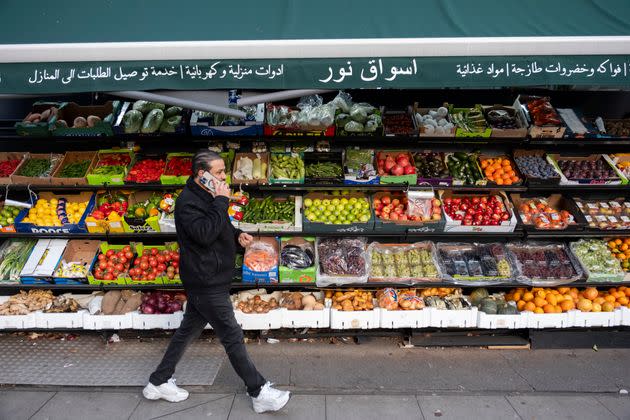Boris Johnson and Rishi Sunak campaigned for Brexit
New Brexit checks on EU goods coming into Britain are about to come in – but why is that important?
Although we left the EU back in January 2020, the government has gotten off track on this particular aspect of the retirement market for years.
It means imported food will become more expensive and there could be shortages, contrary to the original Brexit promises, and importers could struggle with delays.
But, after five separate attempts to delay this legislation, the government is now forced to complete the checks.
What are the new checks?
From 31 January 2024, new border checks on fresh produce will be addressed in the new Target Border Operating Model.
It will be introduced in three phases.
Firstly – from Wednesday – exports of animal and plant products from the EU will have to provide Export Health Certificates to the British authorities.
It means importers will have to notify authorities a day before they arrive in the UK.
Currently, the EU does not need to notify the UK government before bringing in meat and dairy, which means it can come quickly.
Physical checks on shipments will then begin from April 30, and from October 31, shipments will have to pass safety and security certifications.
What impact will these checks have?
Price increases
The price of imported food (especially meat and dairy) will rise.
Director General of the Institute of Export and International Trade – Marco Forgione – told Reuters that large companies should be able to manage, but that smaller companies may struggle to cope with the changes.
He added that small businesses could stop trading with the UK, leading to “price pressure and the possibility of shortages”.
Some EU exporters are not ready to deal with this new amount of legislation and may not want to pay the additional costs of trade checks.
Each consignment can cost between £20 and £43, and each lorry is usually multiple.
These costs are estimated to have an estimated total cost of £330m per year – and any increased cost means food prices will rise, possibly fueling food inflation.


A display of fresh fruit and vegetables outside a shop on Edgware Road on December 6, 2023 in London, United Kingdom.
Delay and shortage
The EU applied the same restrictions to British (GB) goods entering the bloc back in January 2021.
This caused huge delays at ports and some UK exporters even stopped selling to the EU for the time being.
William Bain, head of trade policy at the British Chambers of Commerce, has warned that the slowdown will really be felt from April.
The UK imports up to 70% of its fresh food from the EU in the winter months, falling to around 30% in warmer months, with up to 1,000 trucks arriving at the ports every day.
Therefore delays could mean that the shelf life of fresh food would be reduced by a fifth.
The SPS Certification working group, which represented 30 trade bodies and covered £100billion of the UK’s food supply, described the new rules as “unworkable”.
In a letter to the environment, food and rural affairs secretary Steve Barclay, the experts said this would have a serious impact on the “just-in-time supply of fresh short-shelf life perishable food/ingredients from the EU to the UK”.
Vets in the EU must also sign off on the products – and there are fears there won’t be enough to meet demand.
Confused about how it will work
There is also a lack of transparency from the government, according to industry experts.
Bain told Reuters: “Will the government enforce by preventing material that does not have an electronic EHC from entering the UK border? Or does it let things in and then simply enforce it by contacting the companies involved afterwards?
“The government is not telling us what they are going to do.”
Others worry that the UK does not have the capacity.
Horticultural Trades Association chairman James Barnes said there was a risk that the UK’s new IT infrastructure, processes and systems would not be ready by April.
The Dutch Association of Wholesalers of Floricultural Products called for UK border checks to be delayed until 2025, but this was ignored.
The start date is only 13 weeks away, but the government has yet to publish details of the opening hours of its border posts.
Is this what we were promised?
Not exactly.
As BBC Newsnight’s Victoria Derbyshire pointed out, a prominent Brexiter Jacob Rees-Mogg promised that food would be cheaper, and old PM Boris Johnson He promised there would be no further trade checks – but “both were wrong”.
Rees-Mogg even called introducing such “self-deprecating action” checks in 2022 when he was Brexit chance Minister.
Why are they being introduced now?
The government delayed it to avoid disrupting ports and to prevent the cost of living crisis.
But they are now being brought in because of biohazards, warning of the impact of outbreaks of diseases such as foot and mouth, according to Newsnight coverage.
These checks will also help maintain competitiveness between the UK and its EU counterpart, given that the EU unveiled such checks shortly after the UK left the EU.
How did the government respond?
The government claims that everything is ready to be ready by April and there will be no delay.
According to The Guardian, a government spokesman said: “We remain committed to delivering the highest border in the world.
“The target border operating model is critical to delivering this, protecting UK biosecurity from potentially harmful pests and diseases, and building confidence in our exports.
“We have worked extensively with traders to ensure that the new controls and requirements are clear and unburdensome – which is why low-risk products do not require additional certification or checks, and will have reduced checks on medium risk products, which will reduce the risk of delays.
“We will continue to work closely with businesses across the UK as the controls are implemented.”
Related…